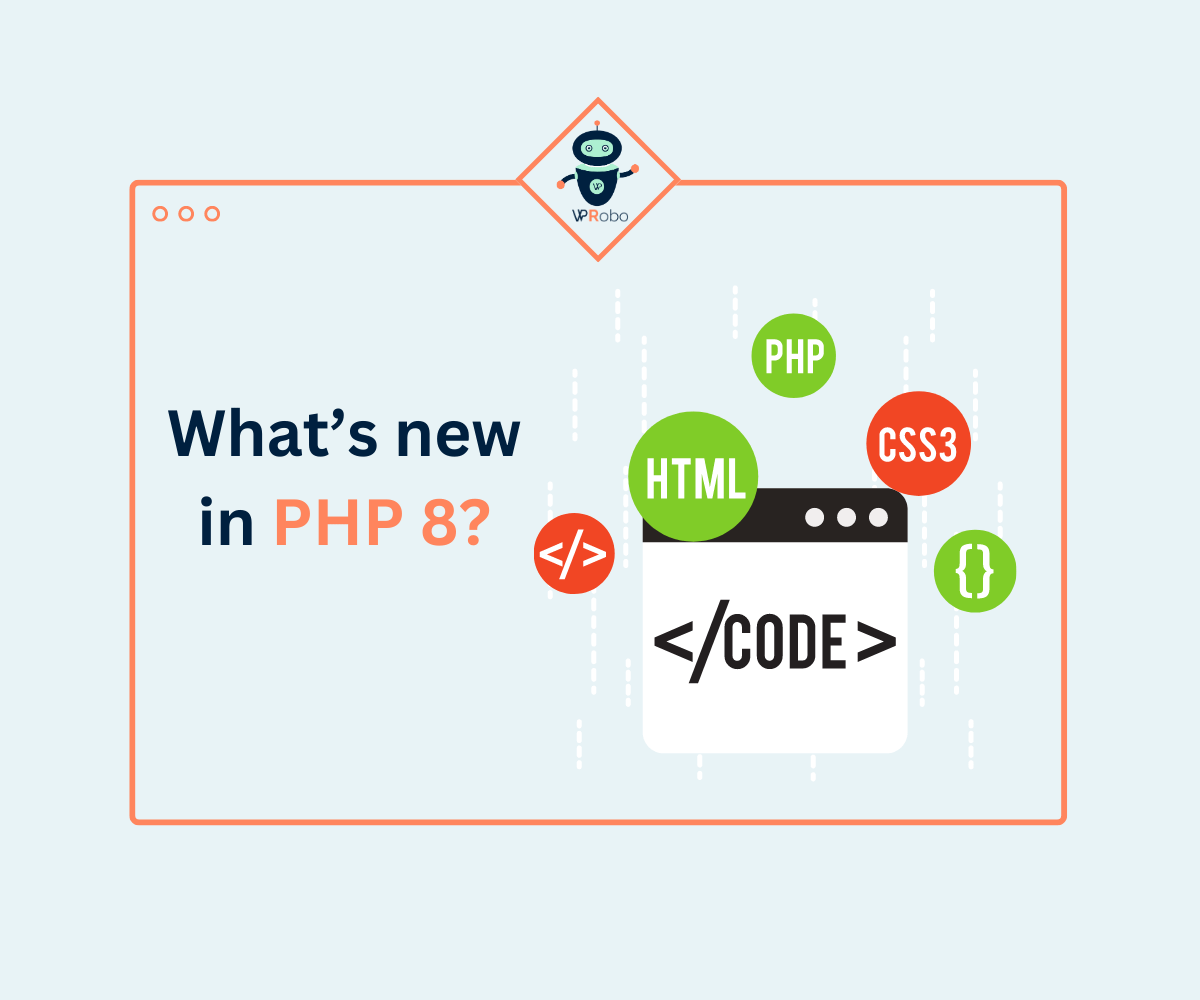What’s new in PHP 8?
For more than 20 years, PHP has been a common server-side scripting language used for web development. The language has received considerable updates and enhancements, making it more robust and approachable, with the introduction of PHP 8 in November 2020. PHP 8 is a major release that brings significant changes and improvements to the language, making it faster, more efficient, and more secure.

With features such as the JIT compiler, union types, nullsafe operator, named arguments, attributes, and match expression, PHP 8 offers developers new tools to enhance their productivity and write better code. As PHP continues to evolve, it remains a popular choice for web development, powering millions of websites and applications around the world. In this article, we’ll examine some of the major additions and improvements made in PHP 8 and discuss how they might help programmers.
JIT (Just-In-Time) Compiler:
JIT compiler implementation is one of PHP 8’s most important additions. The performance of PHP applications may be greatly enhanced using this compiler, which enables the PHP engine to compile code in real time. With the JIT compiler, PHP can now compete with other compiled languages that are renowned for their performance, such as Java, C#, and Go.
In order to reduce the overhead of understanding the code at runtime, the JIT compiler operates by converting PHP code to machine code on-the-fly. Applications written in PHP can now operate up to three times quicker due to the JIT compiler. The JIT compiler works best with long-running PHP scripts, as it can compile the code over time and optimize it for performance. However, it may not be suitable for short-lived scripts, as the compilation time may outweigh the benefits of improved performance.
Union Types:
With the introduction of union types support in PHP 8, programmers may now declare several types that a variable may take. When working with complicated data structures that might contain many data types, this functionality is quite helpful.
Take the following code as an illustration:
In this code, the getLength() function can accept any type of variable, but it only works with arrays and strings. With union types, we can modify the function to be more specific:
Now, the function can only accept arrays or strings, and any other type will result in an exception being thrown.

Nullsafe Operator:
Another beneficial addition to PHP 8 is the nullsafe operator (->?). Without the requirement for null checks, it enables developers to access an object’s attributes or methods in a secure manner. The amount of code required to handle null values, which is a frequent cause of issues in PHP applications, may be decreased with the help of these features.
Take the following code as an illustration:
This code will automatically handle null values and assign null to $value if either $object or $getProperty() returns null.
Named Arguments:
With the support for named arguments introduced in PHP 8, programmers may specify function parameters by name rather than position. With methods that take a lot of parameters, this feature can help make code easier to understand and maintain.
Take the following code as an illustration:
With named arguments, we can modify the function call to be more explicit:
This code is more readable and easier to understand, especially when working with functions that have many arguments.
Attributes:
As an annotation that may be applied to classes, methods, functions, and properties to offer code-related information, attributes are now supported in PHP 8. In addition to giving more capability to classes and functions, attributes may be used to document code, enforce coding standards, and perform other activities.
For example, we can add an attribute to a class to specify that it should be serialized in a specific way:
Attributes can also be used to enforce coding standards. For example, we can add an attribute to a function to specify that it should be called in a specific way:
This attribute will trigger a warning when the oldFunction() is called, reminding developers to use the newFunction() instead.
Match Expression:
A new match expression, which is comparable to the switch statement but more flexible and readable, is introduced in PHP 8. Developers can compare a value to many expressions using the match expression, and the first expression that matches is used to determine the outcome.
For example:
This code will assign a value to $result based on the matching expression.
While PHP 8 offers several new features and improvements, it can be challenging to incorporate these features into your WordPress website without extensive knowledge of PHP development. That’s where WPRobo comes in. With our expertise in WordPress plugin development, we understand the importance of staying up-to-date with the latest technology. So feel free to contact WPRobo if you want our experts to optimize your plugin.
Conclusion:
PHP 8 introduces several new features and improvements that can benefit developers by making their code more efficient, readable, and maintainable. The JIT compiler, union types, nullsafe operator, named arguments, attributes, and match expressions are some of the key features that can help developers write better code in less time. As PHP continues to evolve, it remains a powerful and versatile language that can meet the demands of modern web development.
If you want to upgrade your PHP version, then contact WPRobo today.



